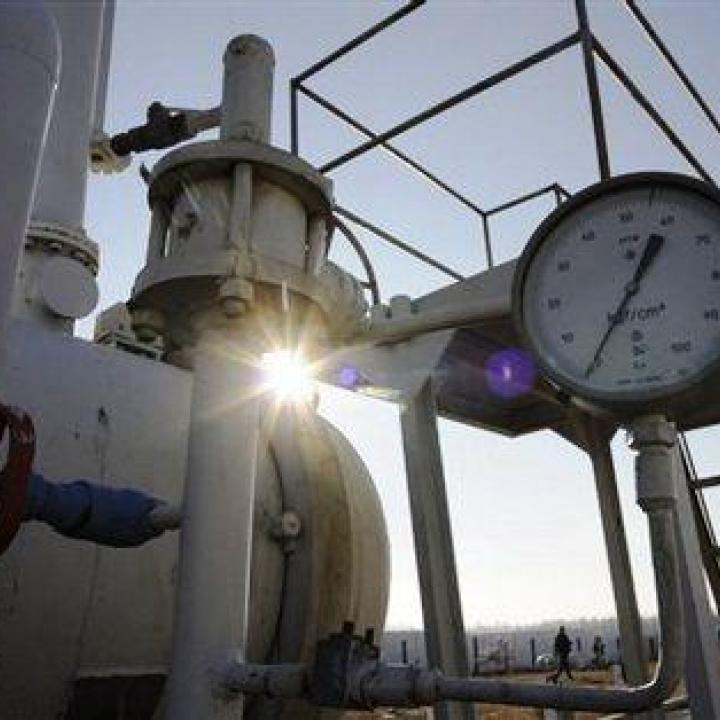
- Policy Analysis
- Policy Alert
Egyptian Offshore Gas Find Curtails Israel's Options

The major discovery is good news for Egypt but will likely impede Israel's much-delayed plans to exploit and export its own offshore reserves.
In an August 30 press release, Italian energy company Eni announced that it has found a "supergiant" natural gas field off the coast of Egypt. Discovered more than 13,000 feet below the seabed in water nearly 5,000 feet deep, the field could contain up to 30 trillion cubic feet (tcf) of gas, one of the largest single finds in history. According to the BP Statistical Review of World Energy, Egypt already has 65 tcf of proven reserves, so the new field could boost this figure by around 45 percent. Put another way, it represents about eighteen years of current Egyptian gas consumption.
The finding will likely complicate Israel's own recent surge in offshore gas plans, which are believed to include potential dealings with Egypt as both a customer and an export partner. By comparison, Israel has so far discovered around 35 tcf in its waters, though only a fraction of this is labeled as "proven." Its largest field, Leviathan, which is yet to be exploited, contains an estimated 22 tcf.
In contrast, Eni stated that it intends to fast-track development of the new Egyptian field, and although several years will still be needed before the first gas flows, the finding could transform the country's fortunes. Since the 2011 overthrow of President Hosni Mubarak, Egypt's domestic consumption of gas has soared, its exports of liquefied natural gas (LNG) have dwindled, and its overland exports to Jordan have decreased drastically due to sabotage of the pipeline crossing the Sinai Peninsula. The drop in export earnings has delayed payments to foreign oil and gas companies, prompting them to review their investment commitments. Eni's find could reverse this downward spiral.
Egypt's good fortune could in turn compound the ongoing friction in Israel's energy policy, which has become a hot-button domestic issue in recent months. Much of the public remains concerned that Delek, the Israeli partner of U.S. gas company Noble Energy on offshore projects, will profit too much from exploitation of the gas. Noble has stopped work on bringing Leviathan onstream and has further delayed expansion of the already-producing Tamar field until Israel's regulatory climate is clarified. In addition, while Noble and Delek have prioritized supplying the Israeli domestic market, more profitable export options under consideration have included a potential agreement to send the gas via undersea pipeline to Egypt's LNG plants -- an agreement that would need to last between fifteen and twenty years to be commercially viable. Egypt's new discovery may mean that only a shorter, unviable commitment could be offered. Yesterday, this prospect prompted Israeli energy minister Yuval Steinitz to describe the Egyptian discovery as a "painful reminder" that "Israel is sleepwalking [while] the world is changing."
A putative Israeli political compromise has been delayed by at least several more weeks because Minister of the Economy Aryeh Deri insists that a new antitrust commissioner be appointed first. And the imbroglio could get even worse if Noble and Delek decide that the Egyptian discovery undermines the basis of their existing draft deal.
Meanwhile, the Noble/Delek plan to exploit the 5 tcf Aphrodite field off the coast of Cyprus will also need to be reconsidered because Egypt was the logical customer for that gas as well. These developments could revive the option of exporting Israeli gas to Turkey, hitherto considered politically impossible while President Recep Tayyip Erdogan remains dominant. Ankara likely has its own issues with the new Egyptian discovery because it lies close to Cyprus's maritime border, which Turkey does not recognize. If the field is found to stretch into the island's exclusive economic zone, Ankara may decide to intervene. Additionally, Turkey is a regional rival of Egypt -- Ankara has strongly supported the Muslim Brotherhood while Cairo is implacably opposed to the group. Indeed, the international and domestic political challenges of Eastern Mediterranean gas almost make the technical obstacles look simple.
Simon Henderson is the Baker Fellow and director of the Gulf and Energy Policy Program at The Washington Institute.



